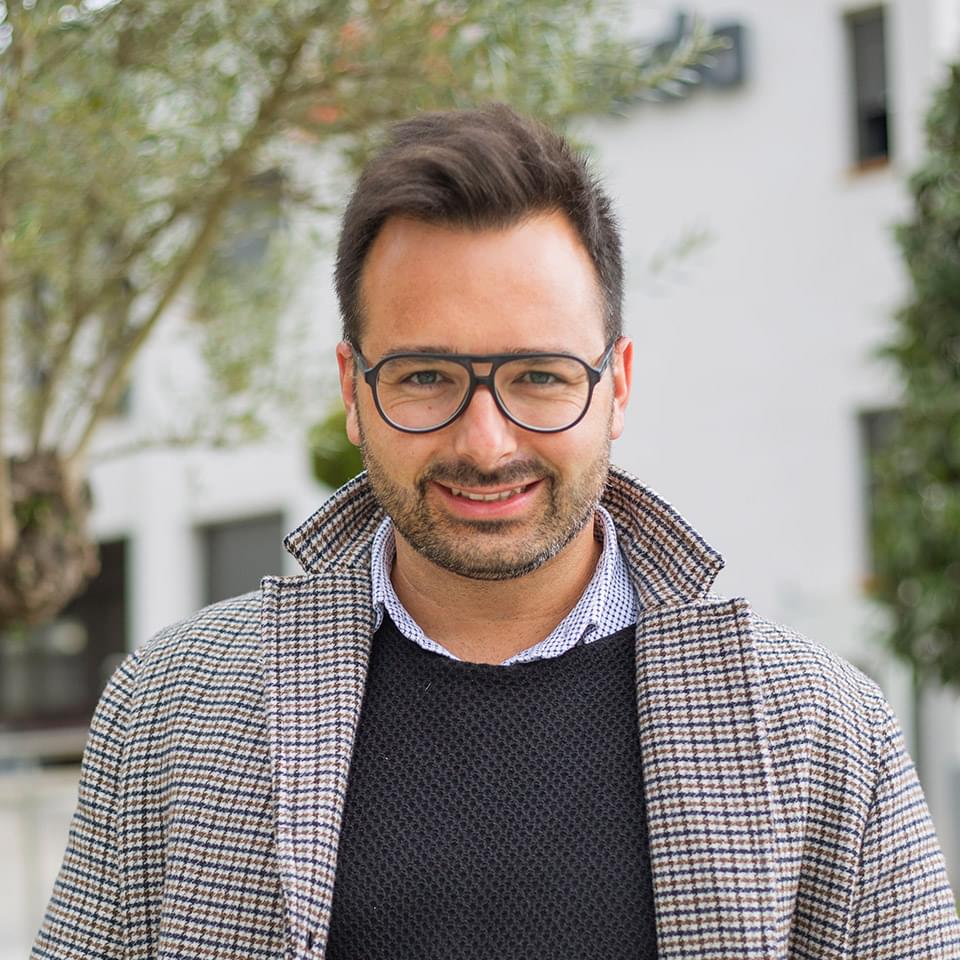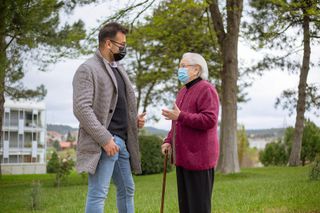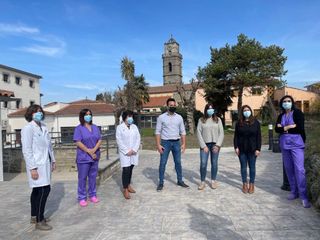
Angel Izquierdo Rojas (born Manresa, 1978), was a member of the first year group on the EHEA Degree in Occupational Therapy at UVic-UCC. He is currently the representative of the Minister of Health of the Government of Catalonia for social issues concerning residential homes in Central Catalonia. While holding this position, he has experienced the effects of the Covid-19 pandemic on the front line.
What does occupational therapy mean to you?
It's a profession that cannot be categorised or explained by a quick association of ideas. For me, it's based on a process of rehabilitation and support for people in different areas of their lives based on activities, techniques and tools that can be adapted to each case. It's what we call "significant occupations", which are the driving force behind active participation in rehabilitation processes, whether they arise from physical, mental or social dysfunctions. The individual is at the centre of the interventions, which seek to motivate the patient to make them proactive.
Why did you choose these studies?
This degree course motivated me because it was an open and innovative type of training. Being a therapist is a profession where the name does not identify the work you do, and sometimes you miss having a well-established professional profile. Nevertheless, I always like to look at the positive side, which is the ability to create a job that is not clearly defined, and which you can model based on your knowledge.
What professional applications does the bachelor's degree have?
We therapists are cross-disciplinary. We are professionals who accompany people throughout their lives, from childhood to old age, specialising in physical, mental and social rehabilitation. There are occupational therapists in special education schools, occupational centres, prisons and working with groups at risk of social exclusion. We can work as direct care professionals or as project or facility managers. Our added value lies in our creativity of intervention processes and in the active participation that this implies. So we work with people to create their rehabilitation process, identify the main significant occupations, and design adapted and personalised intervention plans.
People often say that being a therapist is a totally vocational profession. Do you see it like that?
One of the best things about occupational therapy is it enables you to learn continuously as a professional. Not having any boundaries in which to categorise the profession can sometimes create insecurity, but it also gives you endless opportunities for creation and means that you work in undefined areas, which is very enriching. Occupational therapy has given me a very broad foundation and perspective on life, and that has given me great opportunities. I've worked with many different groups in my career, and I think that few professions offer such a wide range of personal and professional development. Occupational therapy has made me proactive and has given me the confidence to face new challenges.

"Occupational therapy has given me a very broad perspective on life, and that has given me great opportunities"
What path have you followed within occupational therapy?
I did my internship on the degree course at Aspace, a foundation working with cerebral palsy, and afterwards I stayed on there to work. In that organisation, I also worked in an occupational therapy centre where I provided support for patients' activities in their daily lives to foster their autonomy; at a special education school, where I worked with boys and girls aged between 3 to 18 years old who were involved in a learning process to enhance their skills, and in a smart flat as an external consultation service, where we assessed all the resources and technical aids in order to improve people's autonomy in their daily lives. The evolution that people with cerebral palsy can achieve in order to be able to perform activities that are theoretically as simple as getting dressed or working with their computer is amazing, when you work based on therapy. The important thing in this type of therapy is for each person to have a specific and personalised goal that motivates them to keep going. In that case, they will carry out a personalised rehabilitation therapy that will make them improve without even realising it. I was also president of the Professional Association of Occupational Therapy of Catalonia from 2003 to 2005, and I aimed to promote the figure and role of the therapist and foster and reinforce the creation of the professional association.
And since those beginnings?
In management, I was the director of Aspace Home Community Services, where I managed the inclusive leisure service for the community, the adapted sports and respite service. After twelve years at the organisation, I moved from the disability sector to become the director of a municipal day centre for senior citizens. However, the service was suspended at the onset of the pandemic for health reasons, and the Catalan Ministry of Health asked me to provide support when taking over the management of some residential homes that required a limited intervention or support in the management of outbreaks. I managed a couple of fairly large residential homes that were in a critical situation.
Last September I took on my current role, which is the representative of the Minister of Health of the Government of Catalonia for social issues concerning residential homes in Central Catalonia, focusing on coordinating the various measures by the ministries and professionals in residential homes in the region.
Apart from the bachelor's degree in Occupational Therapy, have you studied anything else?
Yes. One of the important things for me in this profession is the related knowledge. I specialise in managing teams and people so that the impact I can generate can reach more people. I took a postgraduate degree in social services management, a master's degree in coaching, and I'm certified as an Evaluator of the EFQM model. As well as my work, I also provide professional consultancy and coaching for businesses. I'm also currently taking a master's degree in transformational leadership where I work on team management, I'm a trainer and I wrote the book Oci i temps de lleure per a col·lectius específics [Leisure and free time for specific groups] for the publisher Santillana.
You've experienced the front line of the pandemic due to your work. What has been the biggest challenge over the last year?
The biggest one has undoubtedly been fear. Just over a year ago we knew nothing about the virus. When we all had to stay at home, I was told to go out. I remember feeling anxious when I went to work because there were centres of contagion where I was going, and not too many PPE or masks. With the country at a standstill, my only instructions were to get things going. All I had was willpower and the challenges of leading a team of people working under a lot of stress and overcoming my fear, because my daughter was waiting for me at home.
Do you sleep more easily now?
Yes, of course. We got teams up and running on the front line, who couldn't drop out because they were responsible for a lot of people. The management of positive cases was the key factor. It also showed me what valuable contributions I could make from my point of view as an occupational therapist, in a large facility, with over a hundred residents. I had to compartmentalise and manage a workforce that was also infected and which was unable to work at full capacity, and so I had to provide some calm at a time when things were grinding to a halt. It was a tight situation, but the human species always adapts.
What was your contribution to residential homes?
As the Minister's representative, I helped create and coordinate what we call Rapid Intervention Teams, based on agreements between different departments (Public Health, Epidemiological Monitoring Service, Primary Healthcare and the Ministry of Labour and Social Affairs). We created these local rapid response teams at each centre which experienced an outbreak to coordinate all the necessary measures. We were dealing with thirty outbreaks at the same time at one point in Central Catalonia. My job was to make sure that all residential homes with outbreaks had this work team set up and to support them, because it was important to be able to respond quickly at any time.
How did your training and experience as an occupational therapist help you with this challenge?
I think my perspective as an occupational therapist helped me to be aware that even in that emergency situation, observations and decision-making had to be focused on people, as always. In that respect, I always understood that the overriding thing, beyond dealing with outbreaks, was to prioritise people's comfort and well-being in order to deal with the pandemic in the healthiest way possible.

"My perspective as an occupational therapist helped me to be aware that even in that emergency situation, as always people had to be at the centre of decisions"
Has vaccination been the key factor?
The vaccine has been the proactive factor that has taken us forward in dealing with the pandemic. Science has had its impact, and the numbers show the overall effectiveness of the vaccine among elderly people. It is also worth mentioning all the work done by the vaccination coordination team, with which I've also been actively involved with logistics all over the region. When the vaccines were created, they had their advantages and disadvantages due to our ignorance of their effects and the logistical difficulties involved (storage at -80 ºC, transportation difficulties ...), and a large proportion of the population is still reluctant to have the vaccination. It is important that we provide a lot of information about the effects of the vaccine and its positive results. I still remember how excited I was to be present when the vaccinations started on 27 December, and to be able to see how the situation has changed dramatically since then.
What has shocked you the most in this past year?
One of the things that has made the biggest impact on me has been the human capital and humanity of all the people involved, no matter how much it sounds like a cliché. That has gone beyond the professional sphere, and not so much in terms of recognition, but instead the vocation that health professionals have. I was able to see it from the inside. There are a lot of people who've been silent, who haven't said anything and who've been very heavily involved, from the management teams at the facilities to a lot of people working long hours.
"In the fight against Covid-19, I've done my bit with a very humane way of doing things, typical of occupational therapy"
And on a personal level, what have you learned?
In terms of skills, I've enhanced my ability to manage teams, and the idea that by working as a team you always do better than when working alone. I think of my humble contribution to being part of the machine, which has helped people to work in this network and these teams. Because of the return we've received, people have thanked us for the way we've been able to work, with the human side. I have been able to contribute what I can, rather than with highly technical knowledge, with a very humane way of doing things, typical of occupational therapy.
Where do you see yourself in a year's time?
I'd like to think that we can get back to normal. As a society we were naive to think that the pandemic would not reach us here. We didn't even believe it when it was in Italy. We need to think about ways of life and consumption, and what the facilities where we need to get old are like. I feel like we are now in a period of construction. It’s been tough, because I've spent a lot of time managing very dramatic and difficult situations, but it’s time to look to the future, to build and plan. I'm focusing on that.